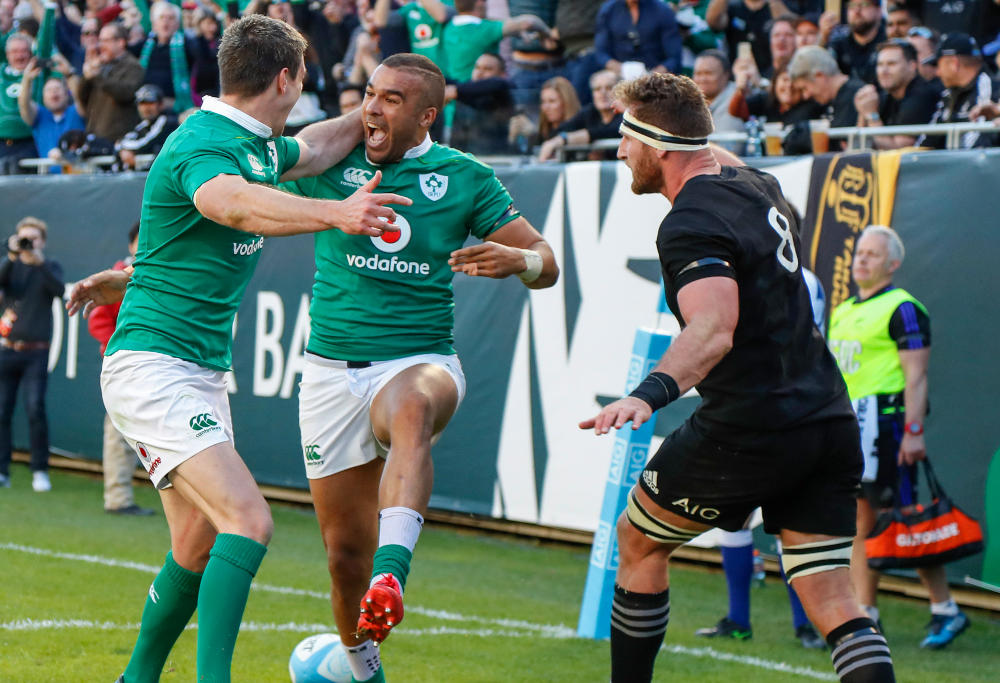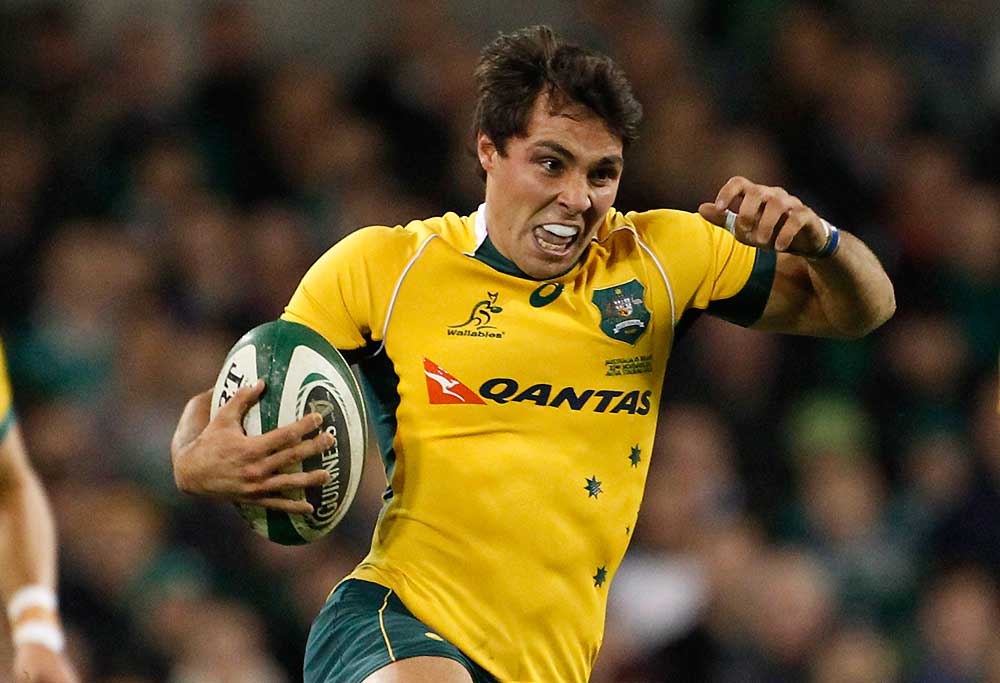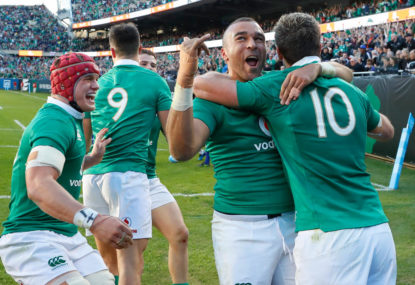After 111 years, at the 29th attempt, Ireland finally have their much-treasured win against New Zealand, thrilling a buzzing Soldier Field in Chicago by winning by 40-29.
If there is any regret that the maiden victory wasn’t achieved in Dublin, it will be only fleeting; there were large swathes of green spread through the crowd and most ‘neutrals’ riding the Cubs bandwagon, keen to keep the roll of underdog winners coming.
And anyway, on this showing, who’s to argue against the notion that a win on Irish soil is only three weeks away? One thing for certain is the Irish won’t be paying $12 to win that match!
The All Blacks scored from their first use – Waisake Naholo slicing through for George Moala’s try – but they wouldn’t be acquainted with the ball for much of the remainder of the first half, possession running at about 70 per cent to 30 per cent.
Ireland followed the blueprint that served them well in 2013, their 25-8 half-time lead matching the All Blacks’ biggest ever deficit at the break. Once this was extended to 30-8, even with thirty minutes remaining, and with some form of comeback inevitable, a four-score margin was asking too much of a side which was fraying and bending in unusual places; like their engine room.
Interestingly, Ireland did many of the things touted in last weeks’ Wrap, most notably controlling the pace of the game. The first half was studded with injury breaks, numerous TMO reviews, and a yellow card that Joe Moody will be feeling very foolish about today; valuable points come while he was sitting down.
The All Blacks thrive when they control the rhythm – as they did for twenty minutes in the second half – but mostly it was Ireland, sucking in air during the stoppages, re-gathering their composure, before firing again in short, sharp, staccato bursts.
Tactically too, they got their mix just right. Kicking high to contests, from 9 and 10 and kick-off, many of which they won, but not overplaying it, as halfback Conor Murray has been prone to do in the past. Critically, they also stayed positive, moving the ball to the edges and backing the mobility of their support players to recycle effectively.
Last week, we identified 30 points as a winning score which would have got the job done by one. In the end, they threw in a few extra for good measure; only the fifth time in their history that the All Blacks conceded 40 points.

There were two telling plays, Ireland in the 48th minute turning down a 45m penalty attempt in favour of Johnny Sexton drilling it to the corner, which set up the maul which in turn created the space for an easy run in by Simon Zebo. Talk about seizing the moment.
And at the end, with the All Blacks within a score of a miracle result, Ireland spread the ball wide to Zebo, whose superb kick and chase helped pin Julian Savea in goal. With Sam Cane head-down in the scrum, Jamie Heaslip breezed into so much space it almost turned Robbie Henshaw’s winning try into an anti-climax.
Another year, another side, and that initial set piece ball, back on the other side of halfway, would never have got past the flyhalf, and Ireland would have fumbled around, nervously trying to hold on for the win.
But Joe Schmidt, his superb ace-in-the-hole Murray, and now all his men, some of those not even his first choice, understand that to beat these All Blacks, you actually have to beat them by playing rugby. By being relentlessly positive, but in a way which blends your natural strengths with the requirements of the modern game.
As a side note, Ireland also got their response to the All Blacks’ haka just right; a poignant tribute to the late and much loved Munster coach Anthony Foley, which all at once respected and enhanced the haka, not trespassed upon it.
While the result brings New Zealand’s run to an end at 18, it is far from a disaster. Ireland’s day was always coming and, to be fair, many were expecting it to be in Dublin.
They fought back gamely, like the champion side that they are, but what was missing compared to 2013 was the clinical edge to their handling and decision making, that players like Richie McCaw and Ma’a Nonu provided that day.
And while their depth remains light years advanced of their competition, it isn’t limitless. Imagine what the bookies might have offered earlier in the season for a second half middle-row combination of Keiran Read and Scott Barrett? Assuming they’d even heard of Barrett.
New Zealand will have taller and stronger timber for the return match, and they will trust that Aaron Smith re-acquaints himself with the cut and thrust of Test rugby; he was very rusty after his enforced lay-off.
Also, whatever credit Steve Hansen gives Ireland – and it will be plenty – he and Wayne Smith will not again tolerate leaking five tries. That is the number, more than any, which will be burning them up as they head to Europe.
For now, at least, we can forget Eddie Jones and England, and even a potential Wallabies grand slam. The rematch shapes as a compelling, mouth-watering climax to end the year.
Earlier, carefully stepping one’s way around the Choeung Ek Genocidal Centre, or what is commonly known as the ‘Killing Fields’, on the outskirts of Phnom Penh, was hardly a typical Saturday preparation for Test match rugby, but one that provided a sober perspective.
Those fans who again this week who took to their keyboards to pillory Wallabies halfback Nick Phipps – whose crimes against humanity include pushing an Argentine medic, throwing Malakai Fekitoa’s boot into the Wellington crowd, and flinging passes near, but not always directly to, his fly-half – might pause to consider that, in the bigger scheme of things, Phipps is one of the world’s good guys.

As it happens, he and flyhalf Bernard Foley distributed the ball so quickly and fluidly in Cardiff, that Wales were unable to gain any foothold in the match, the 32-8 score-line, if anything, flattering the Welsh dragons.
While Foley got most of the accolades from TV comments man Jonathan Davies, it was the platform provided by the Wallabies forward pack that told the real tale. They owned the advantage line, in both attack and defence, in what was most noticeably a true a team effort; forwards seamlessly interchanging roles in ball carry, cleanout and tackle.
The effectiveness of their cleanout allowed a speed of recycled ball that Wales, fatally, weren’t able to slow down. In turn, they were ponderous on their own ball, halfback Rhys Webb too often tickling the ball with his toe before deciding what to do with it which, as it turned out, was no laughing matter.
It reflected both a lack of organisation and a lack of confidence, and Wales will eagerly await the return of key players like Alun Wynn-Jones, Sam Warburton and Talupe Faletau to provide them with on-field direction and leadership.
Australia’s opening was reminiscent of their first quarter against England in Brisbane, and while there were some nervous moments when tries were bombed by Tevita Kuridrani and Dane Haylett-Petty, this was never going to result in the same outcome.
For one, Wales aren’t as assured as England were, and also the Wallabies have improved in the time since June. The signs in Auckland of better cohesion and mental strength were taken to another level here. Not to mention the extra grunt in the middle row.
When a superb piece of interplay between Foley, Reece Hodge and Israel Folau sent Hodge away for a 27th-minute try, the result was never in doubt. It was as if the players decided ‘if our coach is going to be portrayed as a clown, the least we can do is make him a happy clown.’
An indelible memory of my childhood was watching matches from the Arms Park, framed by beautiful, stirring singing from the Cardiff crowd. Granted, there was little for the home crowd to sing about here, but even if there had been, that space has sadly been filled by nondescript, irrelevant and intrusive pop music.
A once unique and iconic venue has become ‘Principality Stadium’. For ‘Principality’, read ‘just another homogenous arena doing the same vanilla things other stadiums around the world are doing’.
At least New Zealand grounds tend to use local artists, even if many of them have long since retired. I’m not sure which Welsh valley Bruno Mars hails from.
So if Welsh rugby might have lost some of its soul off the field, they will surely come again and find it on the field. A gaze to the west, across the Irish Sea, should teach them all they need to know.































































































